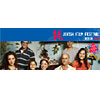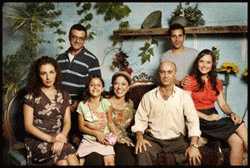AVIVA-Berlin >
Women + Work > WorldWideWomen
AVIVA-BERLIN.de im März 2026 -
Beitrag vom 27.05.2008

Interview mit Clara Khoury
Andrea Petzenhammer
Auf dem Jewish Film Festival 2008 wird die ûÊuûerst erfolgreiche israelisch-arabische Sendung "Arab Work" erstmals in Deutschland gezeigt. AVIVA-Berlin sprach mit der Hauptdarstellerin Clara Khoury.
Es gibt viele MûÑglichkeiten mit einem politischen Konflikt umzugehen, eine Comedy-Serie ist allerdings neu. Der Autor der Sendung, Sayed Kashua, hat eine ûÊuûerst amû¥sante und doch politische Unterhaltung geschaffen, die sowohl israelische als auch arabische Medien provozierte. Auf dem Jewish Film Festival , das vom 25. Mai bis zum 8. Juni 2008 in Berlin und Potsdam stattfindet, wird "Arab Work" zum ersten Mal in Europa vorgefû¥hrt.
Die Serie handelt vom Status der AraberInnen in der israelischen Gesellschaft und den IdentitûÊtskonflikten, die zwischen Integrationswunsch und Tradition entstehen. Sie erzûÊhlt vom Leben einer arabischen Familie mitten in Israel und nimmt alles aufs Korn, was sich an Vorurteilen im Laufe der israelischen Geschichte zwischen Arabern und Juden angesammelt hat. Der Hauptcharakter, Amjad, ist ein arabischer Journalist, der versucht, mûÑglichst jû¥disch zu wirken. Das provoziert natû¥rlich Konflikte mit seinen Eltern und mit seiner Familie, deren Geduld er schwer auf die Probe stellt.
Zur Auffû¥hrung auf dem Jewish Film Festival reisten die Hauptdarstellerin Clara Khoury, der Produzent Danny Aran und der Drehbuchautor Sayed Kashua an. AVIVA-Berlin unterhielt sich mit Clara Khoury û¥ber die Hintergrû¥nde der Serie sowie ihre ganz persûÑnliche Sicht auf den Konflikt und die Art, ihn fû¥r sich zu bewûÊltigen.
AVIVA-Berlin: First of all I want to congratulate for the funny but political style of the really amusing seria "Arab Work". Compared to dramas or documentaries it is a completely different way of handling the conflict. For example in your films "RanaôÇs Wedding", "The Syrian Bride " or "Love Live" the situation is shown very seriously and sad. Do you think a comedy is a better way to explain the Arab-Israeli conflict than serious movies?
Clara Khoury: Comedies are better for the "simple" audience. After a hard day you donôÇt want to see a drama or documentiation, you want entertainment. So itôÇs very important to air this production and continue the series. In the beginning I was not sure how to act in a comedy series! IôÇm used to roles in which facial expression is more important than text. In comedies, all you have to do is speak the text and your work is almost done.
AVIVA-Berlin: The character Bushra, the character you are playing, is a social worker ã a fact, that is not mentioned at all in the first two episodes. Her priorities are taking care for her daughter and keeping the family situation friendly. What were the challenges you faced in playing this role?
Clara Khoury: (laughs) Oh, I just couldnôÇt refuse Sayed KashuaôÇs offer! He is a brilliant author who writes intelligent stories and the character was easy to play. But Bushra is not just a housewife, she is also shown with her laptopãÎ
AVIVA-Berlin: ãÎbut she might also just have checked her emails.
Clara Khoury: Yes, thatôÇs correct. You should tell the author! (laughs)
AVIVA-Berlin: The European audience has no idea about daily life in Israel, they only know about the medialized conflict. So, how "realistic" is "Arab Work"? After all, the series was a cooperative production by Jewish and Arab Israelis.
Clara Khoury: No movie, especially no comedy-series can be realistic. The characters are over-drawn and simbolize characteristics, rather than being full-fledged characters. The author picks up certain characteristics and creates a character representing them, just like AmjadôÇs father, who is completely focused on money. Kashua adresses the issue of finding a Palestinian identity in Israel and arranges the storyline around it. So the core of the story is of course realistic, whereas the story itself is not.
AVIVA-Berlin: How did Israeli audiences react to the series "Arab Work"? Has there been a difference between critiques from Israel and those from other countries?
Clara Khoury: The reactions have been pretty different. In the beginning, the Arab media criticized the series very strongly. They felt affronted and pointed out, that many prejudices might be stabilized through the series. But in the end ã with episode number ten ã they came to understand the aim of the series and the critiques became more positive. The Israeli media and the American audience ã including Jewish and Arab Americans - supported us from the very first beginning.
 AVIVA-Berlin: The Newspaper "Le Monde" described "Arab Work" as "taboo-breaking about all prejudices towards Palestinian people" and the "New York Times" drew the conclusion that with "Arab Work" a series "with a Palestinian viewpoint was added to the mainstream-products in the Israeli entertainment." How would you describe "Arab Work"?
AVIVA-Berlin: The Newspaper "Le Monde" described "Arab Work" as "taboo-breaking about all prejudices towards Palestinian people" and the "New York Times" drew the conclusion that with "Arab Work" a series "with a Palestinian viewpoint was added to the mainstream-products in the Israeli entertainment." How would you describe "Arab Work"?
Clara Khoury: (thinking a while, smiles) OK, that is difficult. I would say the series is significant for the ability to laugh about oneself. ItôÇs important to continue the series because people in all businesses and all social classes know it and learn from it.
AVIVA-Berlin: Can you tell us about the process you go through as an actor in developing the character you are casted as? Do you do research? How do you find your way into the role?
Clara Khoury: That depends to the role. For most roles I do intensive research, I want to feel what the character would feel. For the movie "RanaôÇs wedding" I went to the places where the story was developed, I wanted to feel RanaôÇs life, to smell what she would smell to find a way into her mode of thinking. For "The Syrian Bride" i created an internal monologue for the scenes which have to work without text, so I could imagine what I was speaking. For other characters I participated in a cooking class as well as in a Brooklyn-accent class (laughs).
AVIVA-Berlin: You have been involved in many films with women searching for their identity and their place in society. Which roles do you find the most challenging?
Clara Khoury: As I was starting as an actor I often played weak women, almost victims. But for the last projects I focused on strong characters although I do like both challenges a lot.
AVIVA-Berlin: Your mother is an art teacher, your father a famous actor himself. How have you been affected by this privately and professionally? Did living in an artist-family give you a special viewpoint towards the conflicts in Israel?
Clara Khoury: Hm, let me tell you something about my history. The first intifada started when I was a small child, about ten years old. Until then I had been completly unaffected by the conflict, I went to an Arab school and in the afternoons I had dancing classes with Arab and Jewish children. For me, there was no difference, I didnôÇt even think about it. But then the war started and I just couldnôÇt understand why they were shooting, especially shooting children. One of those little victims could have been me! Thus, I wanted to move to an Arab-only district, because I needed to know who I was and where I belonged to.
Later, I learned to understand the situation and endure it. First of all I feel I am an actress, then I am a woman and then IôÇve got a nationality that is called "Palestinan Israeli". Growing up in an artist family helped me to know who I was and how to handle my life. But sometimes I think, if I had been born in Ramallah for example ã with all disadvantages there are to that ã having an identity would have been easier. As it is, I am a stranger, wherever I go.
AVIVA-Berlin: Have you played an Israeli woman before?
Clara Khoury: No, that was the problem. I have never played an Israeli, except in the theatre when the alienation was forced. But never a serious Israeli role, No.
AVIVA-Berlin: Have you ever lived abroad?
Clara Khoury: I lived in Paris, France for one year when I was 26. I was trying to run from my identity problems . But of course it wasnôÇt easier in France, one might say it was even worse. I was still a stranger, more than ever before. As soon as I had realized that, I went back to Tel Aviv.
AVIVA-Berlin: As a womenôÇs magazine with a feminist focus we are interested in the everyday-life situation in Israel. Do you think women in Israel are equal-treated in judicial and social situations?
Clara Khoury: I think itôÇs just like everywhere, you canôÇt generalize that because every woman is different. But there is a difference between Arab women and Israeli women because of religious traditions.
AVIVA-Berlin: What would be your favourite topic for your next project in movies or theatre, perhaps something you have never done before?
Clara Khoury: Oh, I donôÇt live that way. I canôÇt say "ThatôÇs what I want to do next". I believe in destiny and accept everything that is happening. I learn something new with every character I play. There are always facets in characters which I didnôÇt know. This helps me to learn a lot about myself. Just taking life as it comesãÎ
AVIVA-Berlin: Well, of course we are all curious to hear where we might have the pleasure of seeing you next? Are there any new projects you would like to tell us about?
Clara Khoury: The series "Good Intensions" will be aired soon, and I had a small role in "Bodies of Lies". It was very interesting to work with the American team who created that.
AVIVA-Berlin: Mrs. Khoury, thank you very much for this interview.
Clara Khoury wurde 1977 in Haifa geboren und lebt heute in Tel Aviv. Sie ist "Single ã free to go" wie sie es selbst beschreibt und spielte in vielen Theaterstû¥cken und Filmen fû¥r Kino und Fernsehen. Ihre berû¥hmtesten Auftritte im Theater waren "Antigone" von Jean Anouilh, in dem sie fû¥r die Titelrolle besetzt wurde, und "Glass Menagerie" von Tennessee Williams. Bevor sie in der Fernsehserie "Arab Work" auftrat, wurde sie mit Hauptrollen in "RanaôÇs Wedding" und "Die Syrische Braut" bekannt.
Weitere Informationen zum 14. Jewish Film Festival
www.jffb.de